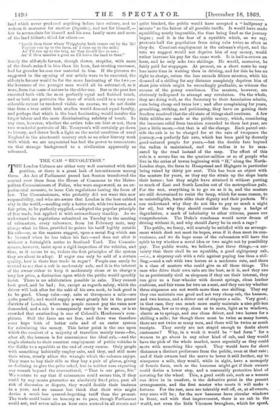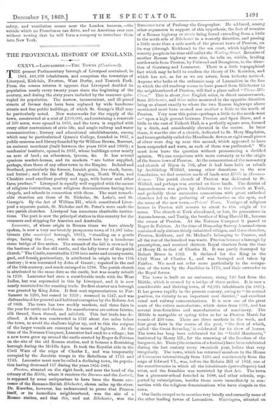THE CAB " REVOLUTION."
THE London Cabmen are either very well contented with their position, or there is a great lack of inventiveness among them. An Act of Parliament passed last. Session transferred the control over them from the House of Commons to the Metro- politan Commissioners of Police, who were empowered, as an ex- perimental measure, to issue Cab regulations having the force of law. The Commissioners, who probably did not want this new responsibility, and who are aware that London is the best cabbed city in the world,—needing only a better cab, with two horses, at a fair price, to be perfectly supplied,—adopted the popular principle of free trade, but applied it with extraordinary timidity. As we understand the regulations submitted on Tuesday to the meeting of cabmasters, every cabowner, from 1st February next, may charge what he likes, provided he paints his tariff legibly outside his cab—or, as the masters suggest, upon a metal flag which can be lowered when he has taken his fare—and does not alter it without a fortnight's notice to Scotland Yard. The Commis- sioners, however, insist upon a rigid inspection of the vehicles, and thus, as it seems to us, violate the first principles of the system they are about to adopt. If sugar can only be sold of a certain quality, how is there free trade in sugar? People can surely be trusted to see that a cab is moderately safe, and it is the interest of the owner either to keep it moderately clean or to charge a very low price, a distinction upon which the public would speedily insist. There is no adulteration possible in cabs. They cannot look good, and be bad ; for, except as regards safety, which the driver will look after for the sale of his own neck, to look good is to be good. Cheap cabs—say, cabs at threepence a mile—are quite possible, and would supply a want greatly felt in the poorer districts of London, where the people cannot pay the rates now demanded, and a cab is consequently rarely to be seen, or is so crowded that overloading is one of Colonel's Henderson's com- plaints. Still the fares are set free, and there was therefore some hope both of better cabs and of an easier system for calculating the money. This latter point is the one upon which the comfort of a majority of travellers mainly turns—for, after all, the hansom is for convenience the ideal cab,—and the single obstacle to their constant employment of public vehicles is the dislike to a squabble at the end of every course. Only people with something habitually employ cabs, and they, and still more their wives, utterly abhor the wrangle which the cabman enjoys. They want to buy their ride as they buy a pair of gloves, giving or declining to give the price asked, but in neither case expecting any remark beyond the conventional, " That is our price, Sir." We venture to say that if cabmasters could secure this, if they could by any means guarantee an absolutely fixed price, past all risk of discussion or dispute, they would double their business in a year, and we cauuot but think that their wits might devise a much less quarrel-begetting tariff than the present. The trade could insist on honesty as to pace, though Parliament could not, and seven miles an hour once secured in all streets not quite blocked, the public would have accepted a " halfpenny a minute" as the fairest of all possible tariffs. It would have made squabbling nearly impossible, the time being fixed as the journey began ; and it is the fear of a squabble which, as we say, prevents half the population from using cabs twice as often as they do. Constant employment is the cabman's object, and the rate we suggest would not deprive him of any money, would rather increase his pay for the same work. It is half-a-crown an hour, and he only asks two shillings. He would, moreover, be fairly paid for stoppages. At present, on a short route he may lose more time in waiting than in driving, and for this he has no right to charge, unless the loss exceeds fifteen minutes, while his demand of a shilling for any distance completely deprives him of short jobs which might be exceedingly profitable, as witness the success of the penny omnibuses. The masters, however, are obviously indisposed to attempt any revolution. On the whole, they are doing well, as the Secretary to their Association admits, corn being cheap and taxes low ; and after complaining for years, grumbling, striking, and petitioning, they have on gaining their freedom resolved that the old state of things shall continue. A few little nibbles are made at the public money, which, considering the immense relief from taxation conceded to them last year, are just a little mean,—but that is all the change. Each parcel out- side the cab is to be charged for at the rate of twopence the journey,—a perfectly fair rate, which has been paid by decently good-natured people for years,—but the double fare beyond the radius is maintained, and the radius is to be mea- sured by the road instead of the map. The effect of this rule is a severe fine on the quarter-million or so of people who live in the series of towns beginning with " H," along the North- London slope, the fares to Hampstead and Highgate in particular being raised by thirty per cent. This has been an object with the masters for years, as they say the strain up the slope hurts their horses ; but they might have attained it without putting so much of East and South London out of the metropolitan pale. For the rest, everything is to go on as it is, and the masters are still determined to resist the lamp, which for some reason, to us unintelligible, hurts alike their dignity and their pockets. We can understand why they do not like to pay so much a night for oil, but why they should consider the lamp a badge of degradation, a mark of inferiority to other citizens, passes our comprehension. The Duke's coachman would never dream of driving without it, and why should Jarvy be in such a rage ?
The public, we fancy, will scarcely be satisfied with an arrange- ment which doe not meet its hopes, even if it does meet its con- venience, and we do hope some of the cabmasters will have the spirit to try whether a novel idea or two might not by possibility pay. The public wants, we believe, just three things,—a cer- tainty that there shall be no squabble, a good eightpenny cab, —i.e., a sixpenny cab with a rule against paying less than a shil- ling,—and a cab with two horses at a moderate rate, and there is a class of masters who could give us all these things. The men who drive their own cabs are the best, as it is, and they can be as persistently civil as shopmen if they see their interest, they can give us a four-wheeler with decent springs, clean leather cushions, and fair room for two on a seat, and they can try whether three sixpences are not worth more than one shilling. They say they can maintain one good and not very cheap cab, the hansom, and two horses, and a driver out of sixpence a mile. Very good ; in that case, they can much more easily maintain a nice pill-box brougham, low as to step, clean as to seats, light as to windows, elastic as to springs, and one clean driver, and two horses for a shilling a mile ; for though there must be twice as many horses, there are not twice as many men, and there will be twice as much receipts. They surely are not stupid enough to doubt about customers? Why, in a week it would be "bad form" for a woman to go about in any other kind of cab, and they would have the pick of the whole market, more especially as they could move with something like speed. They would have for short distances a distinct preference from the public, even at that rate ; and if their owners had the nerve to lower it still further, say to ninepence a mile, they would, while in sight, have a monopoly of female fares, such as the hansoms might get if their owners could devise a lower step, and a reasonably protective kind of covering for the wheel. This, a good swift cab, such as a woman can drive in in comfort, is the defective point in the present arrangements, and the first master who meets it will make a fortune. For the rest, men are tolerably well off, or, at all events, very soon will be ; for the new hansoms have circular windows in front, and with that improvement, there is no cab in the world, not even the little Viennese brougham, which for speed,
safety, and ventilation comes near the London hansom, —the vehicle which no Frenchman can drive, and no American ever sees without vowing that he will form a company to introduce them into New York.







































 Previous page
Previous page